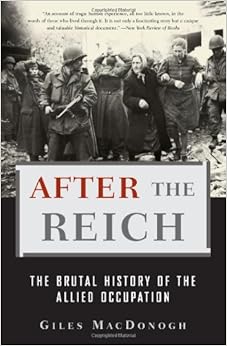
After the Reich: The Brutal History of the Allied Occupation
Giles MacDonogh
(New York: Basic Books, 2007)
618 pages.
UCSB: DD257 .M22 2007
On Line Version:
https://archive.org/details/AfterTheRei ... Occupation
PDF Version:
https://ia801900.us.archive.org/8/items ... pation.pdf
BOOK REVIEWS
Retribution and Reconciliation
In the preface to this book, Giles MacDonogh makes the following observation: "If children are included in collective guilt, this could be accepted on the basis that they were going to grow up to be Germans and therefore possibly Nazis" (p. xiv). With this statement, he raises the troubling moral quandary of Allied behavior in a debilitated Germany after organized resistance crumbled in 1945. From MacDonogh's view, the crimes of the National Socialist regime did not justify the brutalization of the German civilian population, mainly because "it was not the criminals who were raped, starved, tortured or bludgeoned to death but women, children and old men" (p. xiii). To make his case, MacDonogh has waded through multiple first-hand accounts to reconstruct a portrait of incessant despair and injustice, meted out by an alliance of the willing to a population of unarmed, defenseless civilians. Although MacDonogh's narrative gives the reader a fascinating picture of a chaotic and incredibly violent time in world history, he leaves many archival stones unturned. Compounding his methodological shortcomings, MacDonogh fails to differentiate his judgment as a historian from the often overtly racist views espoused by an indignant deposed German nobility, furious with the intemperate louts wreaking havoc on the estates of eastern Germany. In every instance, according to MacDonogh, Allied troops stood by while ignorant riff-raff wreaked a misguided revenge on innocent German civilians who themselves had been victims of Nazi intimidation, Allied bombing, and now postwar reprisals.
Link: https://www.h-net.org/reviews/showrev.php?id=25814
The Squall After the Whirlwind
There's a gruesome last chapter to World War II, the bloodiest war in history. During the forced expulsions of about 12 million Germans from the Reich's eastern provinces, mostly from territory that became part of the newly reconstituted states of Poland and Czechoslovakia, about 2 million died. Imprisonment in former Nazi concentration camps, death marches, starvation, beatings, rapes and outright murder were all commonplace. As the Red Army and many local inhabitants saw it, this was justifiable revenge for Germany's monstrous crimes. The Americans, Brits and French didn't engage in violence on anything close to that scale, but they, too, sometimes let their desire for revenge get the better of them.
For a long time, this record of retribution was a taboo topic outside of Germany. Even the Germans worried that emphasizing their suffering could open them to accusations of rewriting history to cast themselves as equal victims. But since the collapse of communist regimes in their countries in 1989, at least some Poles and Czechs have been confronting that history. (Don't expect anything of the sort from Putin's Russia, where Stalin is glorified once again.) And in the West, this is a painful subject that has been attracting more attention.
Link: http://www.washingtonpost.com/wp-dyn/co ... 01769.html
After the Reich: The Brutal History of the Allied Occupation (review)
In After the Reich, Giles MacDonogh intends to "reframe" the history of World War II and its aftermath. Drawing on what he calls "records of brutality" that he believes other historians have either overlooked or simply ignored, MacDonogh writes that his book gives a "shocking account" of the sufferings of tens of millions of Germans and Austrians who barely survived a massive and brutal occupation. In the title MacDonogh promises readers a "brutal history." He keeps that promise in more ways than one.
Link: https://muse.jhu.edu/login?auth=0&type= ... adams.html